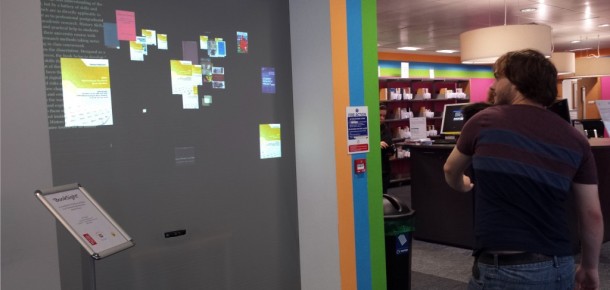As libraries extend their reach beyond the constraint of physical fixed space through the use of online and digital resources, a new paradigm for tools to support the role of the library in the digital age are being considered. The spacial architecture of the physical library has been designed specifically to enable information search and discovery through a transparent classification system and organisation, as well as facilitation of visual browsing. Space needs to be designed to create meaningful context specific situations, and in this sense the library could be seen as an act of inspiration architecture, it enables search, and at the same time physically reminds us the path to discovery doesn’t usually take a straight line. The digital library however, offers little physical or visual feedback, and as libraries themselves move towards blended or fully digital collections this may affect users experience and engagement with the archive or collection, and awareness of personal pathways as well as the activity of others’ within the library space itself.
Booksight is a library information visualisation, designed to curate the real-time flow of book requests which represent the titles and authors of books in a way that offers the viewer novel connections between words and concepts. Firstly, the visualisation seeks to make visible human digital research, by making manifest anonymous research activity for others. Secondly this may present a new space for browsing books in a physical space. Lastly, live ambient library information may be of interest contextually in the library space or through web based browser, in a similar way to the returns shelf.
Approach
‘Booksight’ uses a backend system that receives data of book requests direct from the Library system. A goal of the system is not only to present the data itself, but enrich it, and has the potential using RDF to access the vast store of information using Linked Open Data. Consequently the visualisation goes beyond a simple real time representation of information. Rather it presents then breaks down and remixes individual words that form book titles and authors, then using linguistic style matching it attempts to reconstitute meaning by animating words to approximate conceptual locations.
Summary Findings
An evaluation of the installation was conducted in November 2013 by Mel Woods and Paul Holmes (PhD Intern, Horizon Nottingham) in situ at University of Dundee main Library. The findings and future work will by published and reported here.
Booksight recently won the Imperica Award for ‘Best Artwork’ at EVA Conference 2013, British Computer Society, London.
Related Presentations
- Installation and demo at EVA conference 2013, British Computer Society, London, 30th July 2013.
- Installation at University of Dundee Main Library, Dundee, 22nd Oct – 26th Oct, 2013.
- Presentation at British Library, 2013
- Presentation CIRCLE symposium, Inspace, Informatics Forum, Edinburgh University. 6th May 2013.


